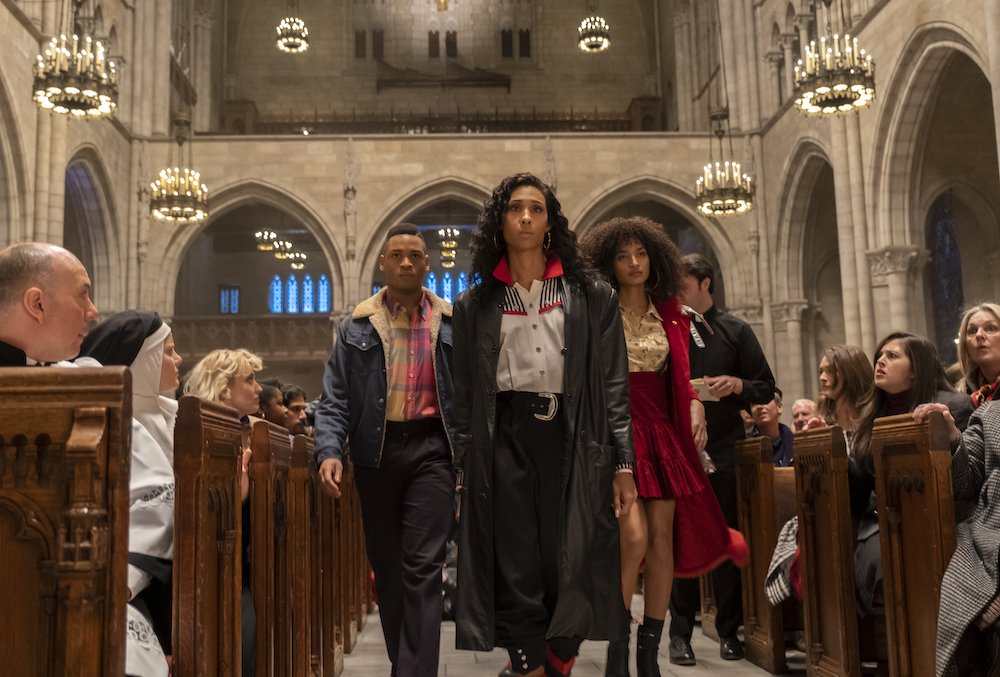“Wake the f**k up,” Pray Tell (Billy Porter) urges one of the bright lights of the ballroom scene, after they skipped an ACT UP die-in protesting the role the Catholic Church was playing in the AIDS crisis to rehearse a big performance. His message is not a subtle one: Like ACT UP, the organization he begins working with in “Pose'”s strong second season, he wants to make clear that Silence = Death, that the joyful, beautiful things in life won’t mean anything if the community in which they exist dies out. Who has time for subtlety or playing nice?
Like Pray Tell, “Pose” has no interest in softening its messaging—though it remains an undeniably gentle series, the capital-I Issues it addresses are approached even more directly than in its already direct, earnest first season. In my review of that season, I wrote, “’Pose’ tries, and tries fervently, to be the most honest and responsible version of itself that it could be. If it sometimes tries just a little too hard, then those missteps are both understandable and forgivable—and maybe even a little endearing.” That’s all still true. This season of “Pose” is more assured, just as engaging, and certainly angrier than the first—it jumps ahead to 1990, and thus it makes sense that Pray Tell, Blanca (MJ Rodriguez), and others would see their grief and fury continue to mount as their tally of funerals attended also climbs. What’s different is that, in the four episodes provided to critics, “Pose” seems a bit less interested in the rich, complex emotional lives of its characters than in the injustices of the world they inhabit.
(I should also note that the first season took a significant step away from its slightly pedantic tendencies in the very first episode following that initial set provided for review; I would not be remotely surprised if the same was true here. This is a writer’s room with a lot to say, and perhaps once they check a few major boxes, they feel free to take more unexpected swings.)

Luckily, both the characters and the injustices remain compelling, and the former is what makes “Pose” worth watching. As the series resumes, we learn that the unlikely peace forged at the end of the first season between Elektra (Dominique Jackson) and Blanca and the rest of House Evangelista seems poised to break, that Damon (Ryan Jamaal Swain) is still dancing and Lil Papi (Angel Bismark Curiel, thriving in a larger role) has gotten his life together. Meanwhile Angel, (the excellent Indya Moore), still sometimes heads down to the piers to make money as a sex worker, despite the danger. But when Nurse Judy (Sandra Bernhard, also in an increased role) tells Blanca that her T cell count is down, bumping her diagnosis from HIV to AIDS, she finds herself once again on a mission to fulfill her dream, and the dreams of others. And right on time, Madonna’s “Vogue” arrives, positioning the community Blanca loves for something like mainstream acceptance.
Life gets in the way, however. Blanca wants to open her own nail salon, Vogue Nails, but butts up against a nightmarish landlady (Patti LuPone); Angel aims to break into modeling but crashes up against barricades both financial and psychological; Pray Tell joins the resistance but can’t bring himself to take AZT, fearing the side-effects, and all the while his acrimonious relationship with Candy Ferocity (Angelica Ross, even better this season) grows tense. Even Elektra, thriving in a new career particularly suited to her temperament and talents, winds up in a dicey situation that leads to one of the season’s most daring storylines, balancing slapstick comedy with all-too-real horror.
Jackson, in particular, has grown as a performer, while Moore, Porter, and Rodriguez continue to give some of television’s finest performances. These actors are so good, in fact, that they make the occasional Very Special Episode moments and history lessons not only palatable, but engaging. It does still sometimes feel like taking your vitamins, but they’re delicious vitamins. And, as with last season, the costuming is excellent, the production design immersive, and the ball scenes as intoxicating and electric as ever. This reaches its peak in the conclusion to the fourth episode, directed by Ryan Murphy. While all of “Never Knew Love Like This Before” exists in a new mode for “Pose,” the ending feels like a spiritual successor to the end of the pilot, which centered on Damon’s extended, unexpected dance school audition. Anchored by a gripping performance and by a director who trusts the nature of that performance is all that’s needed to bring it home, it’s high watermark for “Pose,” perhaps rivaled only by Rodriguez and Porter’s duet in season one.
One thing, however, is abundantly clear: There are more high watermarks ahead. Murphy, Brad Falchuk, Steven Canals, and the rest of the “Pose” writers’ room clearly approach this series with an intensity of focus not dissimilar to Blanca’s in this season. Everything about this show indicates that they feel a sense of responsibility to not waste an opportunity, to seize this moment with both hands and use it to tell stories too often cast aside. There’s humor, glamour and righteous rage, but above all, there’s love. The most glorious thing about “Pose” remains unchanged: At its heart, it’s simply a family drama. The family is one its characters built themselves, in a world where love can be scarce.












